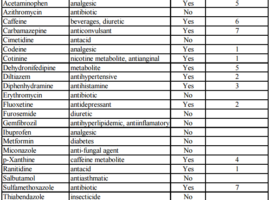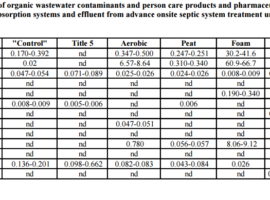Effectiveness of Selected Onsite Wastewater Treatment Systems in Removing Pharmaceutical and Personal Care Products
Authors: George R. Heufelder M.S. R.S.Published: 2007
This project was funded in various proportions by the Massachusetts Department of Environmental Protection with funds from the United States Environmental Protection Agency under the Section 319 Competitive Grants Program. The grants were made to the Barnstable County Department of Health and Environment, the operators of the Massachusetts Advanced Septic System Technology Center. The contents of these reports do not necessarily reflect the views or policies of the departments mentioned nor does the mention of any products, trade names, or companies constitute an endorsement.
Abstract
A preliminary survey was conducted to determine the efficacy of selected advanced onsite septic systems for the removal of selected pharmaceuticals and personal care products (PPCPs). The following technologies were chosen for this survey: standard “Title 5” system comprised of a stone trench overlying 60 inches of sand, an aerobic treatment system that combined fixed film surfaced with activated sludge, a recirculating filter unit containing fibrous peat, a single pass filter with open-cell foam, an upflow sulfur-filled filter following an aerobic treatment unit and a recirculating sand filter designed in accordance with standard practice. A system consisting of a filter of twentyfour inches of sand was used as a surrogate measure of influent wastewater due to analytical issues with examining the matrix of raw wastewater. The results indicate that a standard system with sixty inches of sand treatment was superior to all manufactured units for the removal of the selected PPCPs. The data also called into suspicion the validity of the sand filtered wastewater as an appropriate surrogate measure of influent wastewater and further suggested the potential for soils-based treatment of PPCPs. The report underscores the need for further research into soils-based treatment for PPCPs for the possible incorporation of low-cost modifications to optimize treatment for PPCPs in the onsite setting.


